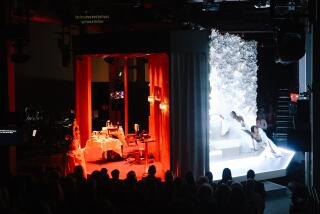OPERA REVIEW : San Diego Revives a Traditional ‘Butterfly’
SAN DIEGO — Traditional opera doesn’t have to be careless opera. Take, for example, the revival of “Madama Butterfly” that opened Saturday night at the San Diego Opera.
There were no theatrical shocks here, and few musical surprises. Everyone involved, from lofty protagonist to lowly chorister, took Puccini at his seasoned word. Luckily, no one took that word for granted.
Kees Bakels of Amsterdam conducted with emotive force that respected both the light and the shade in the score yet avoided sentimental excesses. Adelaide Bishop, a splendid singing actress in her time, staged the proceedings with a loving eye for detail and steadfast avoidance of expressive cliches.
John Scheffler’s hand-me-down picture-post-card set proved eminently functional, and it was sensitively illuminated by Peter Kaczorowski. Zack Brown’s costumes, borrowed from the Washington Opera, accentuated the positive, even to the point of disguising Lt. Pinkerton’s portly physique with a dark off-season uniform.
All this still would have meant relatively little had the cast been perfunctory. This cast wasn’t.
Admittedly, the singing actress confronting the rigors of the title role encountered some problems. But singing actresses encounter problems in this elusive challenge everywhere these days. San Diego holds no monopoly.
Hiroko Nishida, a Japanese native with considerable experience in Germany, was making her American debut on this occasion. She proved more effective dramatically than vocally.
Tiny and fragile, she exuded vulnerable innocence at her first appearance. Cio-Cio-San’s tragedy became all the more poignant as the evening progressed because it was conveyed with such open simplicity.
Her lyric soprano sounded bright and lovely so long as it stayed at mid-range and mid-volume. Unfortunately, in moments requiring climactic stress, the tone became unsteady and the pitch flat. When it came to the cresting D-flat of the entrance aria, she chose the safe anticlimax of Puccini’s lower option. Perhaps it was a matter of nerves.
Jonathan Welch, another popular import on German stages, returned to his home territory as an exceptionally ardent, golden-voiced Pinkerton. At the final cadence of the first act, incidentally, he chose Puccini’s upper option and rose to a ringing, effortless high C. Remember the name.
Although Harlan Foss sounded like a modest Yamadori impersonating the American consul, his sympathetic characterization compensated for any baritonal shortcomings. Here was a Sharpless who conveyed stern exasperation with his caddish countryman and lavished pained, courtly deference upon the abandoned geisha. Even as the ultimate crisis beckoned, he wouldn’t enter her home without taking off his shoes.
The generally strong supporting ensemble included Robynne Redmon as a robust, attentive Suzuki; Joseph Frank as a clever, unexaggerated Goro; Stephen West as a gruff, formidable Bonze, and William Nolan as a pleasant, stolid Yamadori.
Predictably, the Civic Theatre was flooded with cheers and tears at the end. Old “Butterfly” soared and scored again.
More to Read
The biggest entertainment stories
Get our big stories about Hollywood, film, television, music, arts, culture and more right in your inbox as soon as they publish.
You may occasionally receive promotional content from the Los Angeles Times.










